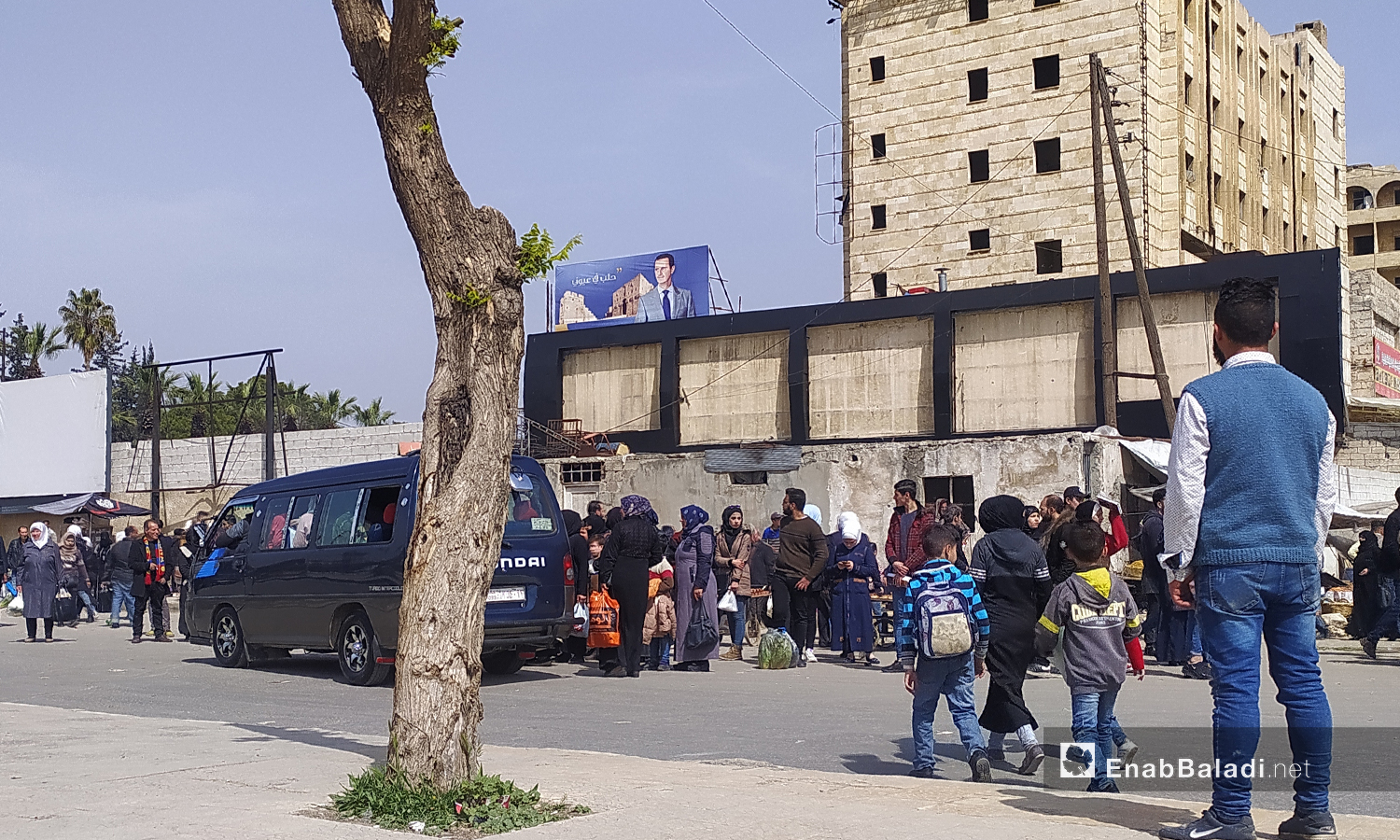



Enab Baladi – Aleppo
The transportation crisis across Syria’s fourteen governorates, mainly the gridlocked city of Aleppo, is further aggravated. It has put all commuters on edge. Employees are showing up late for work during the morning hours.
The crisis, which has gone from bad to catastrophic since last March, has affected most Syrians’ daily life; numerous employees and workers have to travel long distances on foot to reach their destinations.
Enaam works in a sewing workshop in al-Jabriyah district. Unreasonable working hours and unfair wages are not among her biggest challenges over the past few weeks, but rather the transportation crisis. Enaam has to wait, sometimes for long hours, for minibuses in order to get her to and from her workplace.
“During this time, I have to go to work on foot due to the lack of the microbuses. And if I want to ride a microbus, this means that I have to wait for half an hour, and sometimes an entire hour. This is why I prefer to go to work on foot, as a mode of transport,” Enaam told Enab Baladi, referring to the large crowds gathering in the morning hours at transportation stations and on the roads.
However, Enaam has no choice at night but to wait at the bus station for the minibus service because she is afraid to walk home. “The transportation crisis has become the most worrisome thing recently. There have not been any solutions. And if I showed up late for work, the employer would deduct from my salary.”
Since 5 April, the Office of the Prime Minister issued a circular to suspend work or reduce unnecessary working hours for the employees in ministries and public institutions, for ten days, until the arrival of new fuel supplies at the station.
The reduction in working hours of public sector employees coincided with the suspension of work in universities and basic education classes (from the first to the fourth grade) for two weeks, after the increase in student and teacher absenteeism due to the transportation crisis.
Nihad, a student at Aleppo University, spent the whole month of March struggling to get to the university in the morning. He told Enab Baladi, “ I have to wake up at six o’clock and sometimes I have to wait for more than an hour to get a ride.”
Nihad pointed out that bus drivers do not charge the passengers with the fare set by the government, which is 75 Syrian pounds (SYP-0.02 USD); instead, they charge 100 SYP (0.003 USD) from each passenger.
“Some drivers ask their passengers to leave the microbus, arguing that the microbus has run out of diesel or broke down. However, they go back to the station to refill the buses with other passengers, thus they divide the distance into two parts to make more money,” Nihad told Enab Baladi on the condition of anonymity for security reasons.
He added, “We sometimes have to walk long distances to reach a station where mircrobuses are available.”
Taxis are not a good option for students because they are too costly. The shortest taxi ride within the city of Aleppo costs no less than 2,000 SYP (0.67 USD). Taxi drivers justify taxi fare hikes with the shortages of petrol and diesel. Drivers also say that they need to make more money in order to pay the entire repair costs of their broken vehicles.
Drivers of taxis and minibuses believe that the best solution to make up their losses they incur from queueing up in long lines at fuel stations is to set their own fares.
Muhammad, a taxi driver working in Aleppo, told Enab Baladi that taxi drivers have to wait in long lines for almost “one or two days” to refill their vehicles with subsidized fuel depriving them of financial returns. “That is why we have to compensate our financial losses by imposing increased fares on passengers.”
On 29 March, the Aleppo Provincial Council announced a 50 percent reduction in the quantities of subsidized fuel; 20 liters of fuel every seven days are set for private vehicles while 20 liters of fuel are allocated to taxis every four days.
Muhammad is aware that passengers will not ride a taxi unless they are having an emergency situation.
“Some return to take a taxi because they do not want to lose their business or job. So, I do not think that counts as exploitation. And given the situation in the country, we have to increase the costs.”
Muhammad said people are unlikely to file a complaint against taxi drivers when setting high fares, even though many threaten drivers to press charges against them. People do not like to spend at least two months engaged in bureaucratic procedures, such as going to the Traffic Police Department, providing testimonies, and summoning the driver before the court.
A mutual agreement must be made between the taxi driver and passenger on the fare in advance. This can be the best solution, according to Muhammad.
On 15 March, the Syrian regime’s Ministry of Domestic Trade and Consumer Protection increased the price of 95 octane gasoline to 2,000 SYP per liter and 750 SYP for 90 octane gasoline after it was sold for only 450 SYP.
if you think the article contain wrong information or you have additional details Send Correction